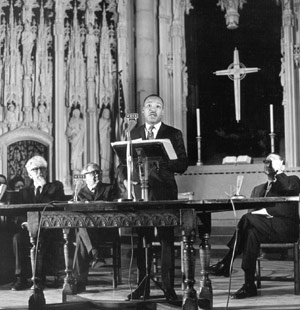Ethel Payne, who at the time worked for the Chicago Public Library, became a trusted lieutenant in Randolph's movement and remained friends with him over the years.
 On August 28, 1963, although no longer a reporter, Payne joined her old colleagues in the press seats as more than 200,000 demonstrators converged on the Lincoln Memorial. The last time there had been such gathering was the smaller Prayer Pilgrimage for Freedom, which Payne had covered six years earlier for the Defender.
On August 28, 1963, although no longer a reporter, Payne joined her old colleagues in the press seats as more than 200,000 demonstrators converged on the Lincoln Memorial. The last time there had been such gathering was the smaller Prayer Pilgrimage for Freedom, which Payne had covered six years earlier for the Defender.Randolph provided opening remarks when the crowd reached the monument. Bayard Rustin paid tribute to black female activists, but highlighting their continued exclusion from leadership posts they were absent from the list of scheduled speakers. Payne’s Little Rock friend Daisy Bates, however, was given a brief moment at the microphone and pledged that women would sit-in, kneel-in, and lie-in to support the struggle.
As the program neared its end, King rose to the deliver a speech intended to serve as the centerpiece of the rally. He had finished it early in the morning, before the sun rose, and a copy had been distributed to the press. As he began to read, the audience reaction was palpable from where he stood on the stairs of the monument.
Seized by the moment, King put aside his script and instead extemporaneously talked about a dream he had been using in recent speeches. “I say to you today, my friends,” said King, “that in spite of the difficulties and frustrations of the moment, I still have a dream.” In words that would be carved on monument and recited by schoolchildren for generations, King began to speak of his vision. “I have a dream that my four children will one day live in a nation where they will not be judged by the color of their skin but by the content of their character.”
It was clear to Payne that King had given up on following his prepared remarks. The reporters around her couldn’t follow the copy of the speech they had been given. “It was truly a spiritual message,” she said. “I saw white and black veteran reporters seated near me with tears in their eyes, stream down their cheeks. I had tears, too.”
A few days later, while staying at the Sheraton-East Hotel in New York, Payne took out a piece of the hotel’s stationery and wrote to Randolph. “Dear Phil,” she began, “We are still glowing from the great experience of the March last Wednesday. Remembering 1941 and 1942, I can say I’m glad that at long last your dream did come true.


